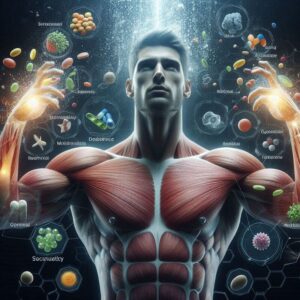Unlock Your Potential: Essential Nutritional Strategies for Optimal Muscle Recovery
The specific macronutrient ratios in your diet are crucial for achieving optimal muscle recovery. The three primary macronutrients—protein, carbohydrates, and fats—serve as more than just energy sources; they are the building blocks of your body’s structural integrity and are essential for a myriad of physiological functions. Each macronutrient plays a unique role in repairing and regenerating muscle tissue. Therefore, anyone serious about enhancing their athletic performance and recovery must grasp how these nutrients work in harmony to support their fitness goals effectively.
Among these, protein stands out as particularly vital for muscle recovery since it consists of essential amino acids crucial for effective muscle repair and growth. Consuming an adequate amount of protein after exercise significantly boosts muscle protein synthesis, the biological process through which new muscle proteins are created, while simultaneously curbing the breakdown of existing proteins. This delicate balance is essential for effective muscle recovery, leading to faster recuperation and improved adaptation to the stresses of training. Additionally, carbohydrates are indispensable for replenishing glycogen stores that are depleted during intense workouts, ensuring you have the necessary energy for future training sessions. Lastly, fats play a supportive role in energy production and hormone regulation, both vital aspects of the muscle recovery process.
Determining the optimal macronutrient ratio for muscle recovery requires a personalized approach that considers individual factors such as body composition, workout intensity, and specific fitness objectives. However, a widely accepted guideline suggests consuming a blend of protein and carbohydrates within 30 minutes to 2 hours post-exercise to maximize recovery. This timing is crucial because your body is in a heightened state of nutrient absorption during this recovery window, making it the perfect time to nourish your muscles effectively.

Discover the Best Protein Sources to Enhance Muscle Recovery
Recognizing that protein is more than just a dietary element, but rather a critical component in muscle recovery, is essential for anyone engaged in physical training. It provides the necessary amino acids for both muscle repair and growth, making the inclusion of protein-rich foods in your diet vital for optimizing muscle restoration and overall performance. High-quality sources of animal protein, such as eggs, dairy products, lean meats, fish, and poultry, offer complete amino acid profiles that are particularly effective for muscle regeneration and recovery.
If you prefer plant-based options or wish to diversify your protein sources, numerous excellent alternatives exist. Foods like lentils, chickpeas, and black beans are not only nutritious but also rich in protein, contributing positively to muscle recovery. Moreover, versatile options like tofu, tempeh, edamame, and other soy-based products serve as fantastic complete protein sources. These can be seamlessly integrated into a well-balanced diet to support muscle healing and overall nutrition.
Additionally, protein supplements such as whey, casein, or plant-based powders can significantly boost your protein intake specifically for muscle recovery. These supplements provide a convenient way to ensure you meet your post-workout protein needs, allowing you to easily incorporate them into your favorite smoothies, shakes, or meals, thus maximizing your recovery potential and enhancing muscle growth.
Replenish Glycogen Stores with Carbohydrates for Optimal Muscle Recovery
Carbohydrates are fundamental to muscle recovery as they help restore glycogen stores depleted during vigorous physical activity. Consuming carbohydrates within the first 30 to 60 minutes after exercise can significantly aid in replenishing energy levels and accelerating muscle regeneration. During intense workouts, your muscles primarily depend on glycogen as their main energy source, and your body is most efficient at storing glucose immediately after exercising. Therefore, the timing of your carbohydrate intake is crucial and can greatly influence muscle glycogen synthesis and overall recovery outcomes.
Incorporating a diverse selection of nutrient-dense foods, such as legumes, fruits, and vegetables, which are high in natural sugars and starches, can significantly enhance your muscle recovery while providing numerous health benefits. These foods are rich in fiber and packed with essential nutrients, offering a steady release of energy alongside the vitamins and minerals necessary for overall well-being and effective recovery. By prioritizing complex carbohydrates in your meals, you can make informed dietary choices that greatly contribute to your body’s nutritional needs and recovery efforts.
Proper post-exercise nutrition is a critical component of muscle recovery. Combining carbohydrates with protein can dramatically improve muscle glycogen resynthesis and promote effective muscular repair. This powerful nutrient combination also stimulates insulin release, which facilitates the transport of glucose and amino acids into muscle cells, further enhancing recovery and repair processes. Ensuring a balanced intake of both carbohydrates and proteins will significantly support your muscle recovery journey.

Incorporate Healthy Fats for a Comprehensive Approach to Muscle Recovery
While protein and carbohydrates often dominate discussions about muscle repair, dietary fats are equally essential for a holistic approach to recovery and overall bodily function. Healthy fats are crucial for hormone production, particularly testosterone, which plays a significant role in both muscle growth and repair processes. Foods rich in omega-3 fatty acids, such as walnuts, flaxseeds, and fatty fish, provide anti-inflammatory benefits that can help reduce exercise-induced inflammation and accelerate muscle recovery. Furthermore, these fatty acids contribute to the formation of cell membranes essential for muscle repair and regeneration.
Including a diverse range of healthy fat sources, including nuts, seeds, avocados, olive oil, and fatty fish, can offer substantial benefits for both your overall health and muscle recovery. These fats are not only delicious but can be effortlessly integrated into your post-exercise meals or snacks, providing necessary energy while supporting various physiological processes associated with recovery. Explore different options, experiment with recipes, and make a conscious effort to include healthy fats in your diet; your muscles will undoubtedly appreciate the effort!
While fats are an important part of a balanced diet, moderation is crucial. It’s essential to avoid excessive intake of unhealthy fats, such as trans and saturated fats, as these can increase inflammation and hinder overall healing and performance. Therefore, striking the right balance of fats in your diet is vital for achieving optimal muscle recovery and maintaining general health.
Understand the Critical Importance of Hydration for Effective Muscle Recovery
One of the most frequently overlooked aspects of muscle recovery is the essential role of hydration. During physical activity, our bodies lose fluids through sweating, and failing to replenish these lost fluids can lead to dehydration. This condition can significantly impair performance and extend muscle recovery time. Dehydration negatively impacts the transport of nutrients to muscles, increases the risk of cramping, and may even contribute to muscle damage.
Maintaining adequate hydration not only supports muscle recovery but also enhances overall health and well-being. Proper fluid intake facilitates the transportation of nutrients, regulates body temperature, and assists in waste elimination. Ensuring that you stay well-hydrated before, during, and after exercise is essential for facilitating muscle recovery. While water is the most effective hydration solution, consider incorporating electrolyte-rich beverages like sports drinks or coconut water to replenish lost electrolytes during intense physical activity.
Being mindful of your body's hydration signals is crucial for maximizing recovery. Monitoring indicators such as urine color, changes in body weight, and sensations of thirst can provide valuable insights into your hydration status. This self-awareness can help you maintain optimal fluid intake, thereby promoting maximal muscle repair. Additionally, including more water-rich foods, such as fruits and vegetables, can further enhance your hydration and recovery efforts, ensuring your body is well-equipped to recover from strenuous workouts.

Essential Micronutrients to Accelerate Muscle Recovery and Enhance Performance
Understanding the importance of micronutrients, which encompass vital vitamins and minerals, is crucial for effective muscle recovery and overall health. These micronutrients are not just optional supplements; they are essential components that influence various physiological processes, including exercise performance and recovery. For instance, the antioxidant properties of vitamin C can help mitigate the inflammation and oxidative stress that occur during exercise, while vitamin D plays a key role in maintaining bone health and facilitating optimal muscle function.
Key minerals such as iron, magnesium, and zinc are instrumental in energy production, oxygen transport, and muscle function during physical activity. To support optimal muscle repair, it is essential to consume a well-rounded diet rich in fruits, vegetables, whole grains, lean meats, and healthy fats. By ensuring a diverse intake of these nutrients, you can significantly enhance your muscle recovery and overall health.
While athletes might consider supplementing with specific micronutrients to address deficiencies or meet the increased demands of rigorous training, it is crucial to seek professional advice. Consulting with a healthcare professional or a certified dietitian before starting any supplementation regimen can ensure safety and effectiveness, helping you make informed choices about your dietary strategies.
Ultimately, food plays a pivotal role in muscle recovery following intense physical activity. Striking the right balance among macronutrients—including protein, carbohydrates, and fats—along with proper hydration and micronutrient intake is vital for effective muscle regeneration and enhancing athletic performance. By being mindful of your dietary choices and providing your body with the necessary nutrients, you can foster quicker healing, decrease the likelihood of injury, and elevate your overall fitness level.
FAQs: Your Guide to Understanding Muscle Recovery and Nutrition
What is the process involved in muscle recovery?
Muscle recovery refers to the intricate and multifaceted process through which muscles repair and rebuild after undergoing physical stress, such as exercise or resistance training. This essential process is key to promoting muscle growth and improving overall physical performance, enabling your body to adapt to the demands of training while minimizing the risk of injury.
In what ways does diet impact muscle recovery?
Your diet is a crucial factor influencing muscle recovery, as it provides the necessary nutrients that facilitate muscle repair and growth. Achieving the right balance among macronutrients (protein, carbohydrates, and fats) and micronutrients (vitamins and minerals) is essential for optimizing muscle recovery and overall athletic performance, ensuring your body is well-prepared for future workouts.
What is the best dietary approach for muscle recovery?
The most effective diet for muscle recovery typically includes a balanced combination of high-quality protein, carbohydrates, and healthy fats. Foods rich in protein, such as lean meats, fish, eggs, and dairy products, are particularly beneficial for supporting muscle repair and growth. Carbohydrates are essential for providing energy for workouts and replenishing depleted glycogen stores, while healthy fats contribute to overall health and hormone production, making them integral to your recovery strategy.
How much protein should I consume to enhance muscle recovery?
The general recommendation for protein intake aimed at muscle recovery ranges from 1.2 to 2.2 grams of protein per kilogram of body weight per day. This range may vary based on individual factors, including activity level, muscle mass, and specific training goals. Tailoring your protein intake to your unique needs will help you maximize recovery and muscle growth.
Are there specific foods that can enhance muscle recovery?
Foods rich in protein, such as chicken, turkey, salmon, eggs, Greek yogurt, and tofu, are particularly effective in supporting muscle recovery. Additionally, incorporating complex carbohydrates from sources like whole grains, fruits, and vegetables, alongside healthy fats from avocados, nuts, and olive oil, can further aid in muscle recovery and improve overall athletic performance, fostering a well-rounded dietary approach.
Should I consider using supplements to support muscle recovery?
While a nutritious, well-balanced diet can typically provide the essential nutrients needed for muscle recovery, certain individuals may benefit from supplementing with protein powders, branched-chain amino acids (BCAAs), or creatine to support their recovery and performance goals. It is important to consult with a healthcare professional before introducing any supplements into your diet to ensure safety and effectiveness, making informed choices about your nutrition.
This valuable information is brought to you by:
Reliable References for In-Depth Insights on Muscle Recovery and Nutrition
Nourish Your Hair: Protein Intake and Hair Health. https://www.theproteinfactory.pk/blog/protein-and-hair-health/
The Maximum Calorie Intake to Lose Weight | Woman – The Nest. https://woman.thenest.com/maximum-calorie-intake-lose-weight-17436.html
The Article: Optimal Diet for Muscle Recovery appeared first on Acupuncture Cottam.
The Article Muscle Recovery: The Optimal Diet You Need appeared first on https://mcrtherapies.com
The Article Optimal Diet for Muscle Recovery You Need Was Found On https://limitsofstrategy.com


The emphasis on the specific roles of macronutrients in muscle recovery is indeed a critical aspect often overlooked in fitness conversations. I’ve noticed that many athletes tend to focus primarily on protein intake without fully appreciating the synergistic effect of carbohydrates and fats in the recovery process. For instance, while protein is essential for repairing muscle fibers, carbohydrates play a pivotal role in replenishing glycogen stores deplete during exercise. An example from my own experience: after a particularly grueling workout, I started incorporating a post-exercise smoothie that combines protein powder, banana, and a tablespoon of nut butter. This not only enhances muscle recovery but also helps maintain my energy levels for subsequent training sessions.
This is a fascinating exploration of the role macronutrients play in muscle recovery! I’ve always found the science behind nutrition to be incredibly compelling, especially regarding athletic performance. Personally, I’ve experienced the difference in recovery times when adjusting my protein intake after workouts. It’s like giving your muscles a direct fuel source they can draw from for repair and growth.
It’s great to hear your thoughts on the topic! The connection between nutrition and athletic performance really does resonate on so many levels. Your personal experience with protein intake highlights a key aspect of recovery that often flies under the radar. It’s fascinating how personalized nutrition can be; what works for one often needs tweaking for someone else.
Thank you for sharing your experience! If you’re interested in diving deeper into optimizing your nutrition for recovery, check out this helpful resource [insert link]. It could really enhance your understanding and performance!
https://arquiaca.org/ChocolateHealth
I completely agree with you on the personalized nature of nutrition and how crucial it is for athletic performance. It’s intriguing how our bodies respond differently to certain foods and macronutrients, isn’t it? For me, I’ve noticed that tweaking my carbohydrate intake around training sessions has made a significant difference in my energy levels and recovery times as well.
I totally agree that understanding macronutrients is crucial for anyone looking to maximize muscle recovery. I’ve found that balancing my protein intake right after a workout really makes a difference in how I feel the next day. But I’ve also started paying attention to carbohydrates, especially in post-workout meals. It’s fascinating how they help replenish glycogen stores and give that much-needed energy boost.
I completely resonate with your experience. Balancing protein intake right after a workout can really set the tone for recovery. I’ve found that having a quick shake or some lean protein source really helps me feel re-energized the next day.
It’s interesting how that window right after a workout can really shape our recovery. I’ve noticed that the type of protein I choose sometimes impacts how I feel the next day too. For me, I tend to lean towards whole foods when I can—like grilled chicken or Greek yogurt—though shakes are definitely a lifesaver when I’m short on time. It’s almost like our bodies are craving that balance of nutrients after exertion, isn’t it?
It’s fascinating to hear how you’ve tuned into the way different protein sources affect your recovery. That post-workout window really does feel like a critical moment for many of us. It’s like our bodies are sending out signals about what they need to bounce back. Whole foods like grilled chicken and Greek yogurt not only pack a punch in terms of protein but also bring along a nice range of vitamins and minerals that can help with recovery.
I completely agree about that post-workout window being so crucial. It’s almost like our bodies are giving us a glimpse into what they truly need after putting in all that effort. I’ve noticed that when I focus on whole foods, like grilled chicken or Greek yogurt, my recovery feels more comprehensive—not just in muscle recovery but in overall energy levels.
It really is interesting how in tune our bodies can become with different foods after a workout. I’ve definitely found that certain protein sources not only help with recovery but can also change how I feel physically and mentally the next day. For instance, I’ve noticed that plant-based proteins, like lentils or chickpeas, can leave me feeling lighter, and they have their own unique set of nutrients that can be quite beneficial.
I can relate to that feeling of being re-energized after hitting that post-workout protein goal. It’s interesting how much the right nutrition can influence recovery. I usually go for a mix of Greek yogurt and fruits in a smoothie; it’s a nice balance of protein and carbs that keeps me feeling good for the day.
Ah, the post-workout protein ritual—like a holy grail for anyone trying to avoid feeling like a zombie the next day. I totally get what you’re saying about that quick shake; it’s like the kickstart you didn’t know you were missing.